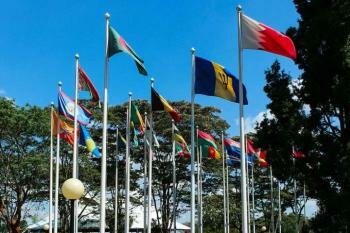UNEP Compares Options for Science-Policy Interface on Chemicals and Waste
By IISD’s SDG Knowledge Hub , November 18, 2020
The UN Environment Programme (UNEP) published a report to facilitate and inform discussions on strengthening the science-policy interface (SPI) for chemicals and waste management. The report is a response to a request from the fourth session of the UN Environment Assembly (UNEA-4), which underscored the need to strengthen the SPI at all levels to support and promote science-based local, national, regional, and global action on the sound management of chemicals and waste beyond 2020.
The report titled, 'Assessment of Options for Strengthening the Science-Policy Interface at the International Level for the Sound Management of Chemicals and Waste,' reviews existing SPI platforms, which can facilitate policy design and decision-making by Conferences of the Parties (COPs) to multilateral environment agreements (MEAs), and support national agencies and other groups through awareness-raising activities, capacity-building, and development of policy tools.
According to the report, successful SPI platforms include the Intergovernmental Panel on Climate Change (IPCC) and the Intergovernmental Science-Policy Platform for Biodiversity and Ecosystem Services (IPBES). While nothing similar exists for chemicals and waste, the authors note that the IPCC and IPBES provide potential models as independent platforms that are responsive to the needs of the climate and biodiversity conventions, respectively.
Other types of platforms include the global mercury assessment, which informed the development of the Minamata Convention on Mercury, and assessments mandated by the Montreal Protocol, which have influenced adjustments and amendments to the Protocol. Existing SPI platforms working on chemicals and waste management include subsidiary advisory bodies that recommend actions to support MEA implementation, such as the Stockholm Convention’s Persistent Organic Pollutant’s Review Committee (POPRC).
The report also considers possible impacts of and outputs from a strengthened platform, including informing the policymaking process and linking scientific knowledge and evidence with policymakers at each stage of the process. To deliver authoritative outputs that are "policy relevant but not policy prescriptive," the report explains SPI platforms must be perceived as legitimate, relevant, and transparent. Design choices could affect their perceived legitimacy, as would composition, representativeness, and participation of stakeholders.
The report outlines possible options for strengthening the SPI at the international level. The first option, an independent platform, similar to the IPCC and IPBES models, would produce authoritative assessments, engage in horizon scanning, and identify emerging issues. The body could also build capacity, catalyze knowledge generation, and develop policy tools, and would require close ties to relevant decision-making bodies. Drawbacks of an independent body include lag time in responding with scientific advice, as infrastructure and systematic production, review, and adoption processes for IPCC and IPBES assessments often take several years, although IPBES has developed a fast-track process.
A second option calls for institutionalizing the Global Chemicals Outlook (GCO) and Global Waste Management Outlook (GWMO) processes so they do not depend on UNEA resolutions or prioritization given the UNEP's crowded work programme. This would enable rapid implementation and increased visibility to outputs of existing SPI platforms, and would be less costly than an independent platform. Potential weaknesses include that: GCO and GWMO may not be best suited to horizon scanning or rapid production of science advice, as the schedule might take several years from initiation to output; and conclusions would be agreed by a steering committee, rather than adopted intergovernmentally.
The third option, thematic subsidiary panels, would include specialized task forces, similar to SPI arrangements under the Vienna Convention and Montreal Protocol. Panels could be established as needed and supplemented by task forces responsible for cross-cutting work. Such an SPI could: be highly responsive to the body or bodies to which it reports; facilitate exchanges among experts; and create a space for scientific and technical discussions. This option would be less costly than an independent platform. If subsidiary to UNEP and/or the World Health Organization (WHO), a potential weakness could be that such an SPI platform risks overloading an already crowded agenda. In addition, reports would not be approved through an intergovernmental process, as is done in the IPCC and IPBES. However, an SPI jointly administered by UNEP and WHO would avoid duplication of effort and potential inconsistencies. [Publication: Assessment of Options for Strengthening the Science-Policy Interface at the International Level for the Sound Management of Chemicals and Waste]


